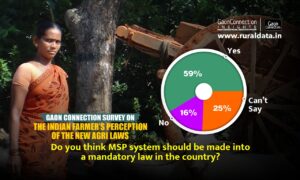It’s been more than one-and-a-half-months since President Ram Nath Kovind signed the three agri bills that are now the law of the land. But, farmers in Punjab and Haryana are still protesting against these three acts, which they fear hurt the farmers and promote the interest of private companies in farming.
However, there is a large chunk of farmers in the west region of the country — Maharashtra, Gujarat and Madhya Pradesh — which support these new farm laws. “We have welcomed the three laws. Mano jaise hath paer ki janjeere toot gayi. (It feels like we are free from chains now),” Deepak Gheusan Pagar, a farmer from Nashik, Maharashtra told Gaon Connection. He grows a variety of crops such as cotton, soybean, maize, and sugarcane, in his 25-acre (10.11-hectare) land.
“Earlier, middlemen would illegally sell cotton from Maharashtra to traders in Gujarat and Madhya Pradesh. They would buy cotton for three thousand to three thousand five hundred rupees a quintal from us and sell there for four thousand rupees. Now with one nation-one market, traders would be able to directly buy from us instead of giving extra amounts to middlemen,” he said.
This excitement of farmers like Pagar was reflected in the recent rapid survey, ‘The Indian Farmer’s Perception of the New Agri Laws’, conducted by Gaon Connection across 53 districts in 16 states of India. As part of this survey, the country was divided into five zones — North, North-West, East, West, and South – and 5,022 farmers interviewed.
The survey found 35 per cent respondent farmers supported the new acts, whereas more than half — 52 per cent — were against these laws. Interestingly, a large percentage of farmers supporting/opposing the laws didn’t know about the details of these laws.
While 77.2 per cent of respondent farmers in the North-West region including Punjab, Haryana, and Himachal Pradesh, opposed the farm laws, every second farmer (52.1 per cent) in the West region– Maharashtra, Madhya Pradesh, and Gujarat — supported these laws.
Interestingly, nearly half of the farmers in both the North region (Uttar Pradesh, Bihar, and Uttarakhand) and West region were optimistic that the farm laws would bring a positive change in the agriculture sector as against farmers from the North-West zone who did not think so.
West zone farmers most hopeful of doubling of their income
As part of the ‘Atma Nirbhar Bharat – Agriculture’, several market reforms have been rolled out by the Indian government and the three new agri laws are a part of these reforms. These laws include, the Farmers Produce Trade and Commerce (Promotion & Facilitation) Ordinance, 2020; the Farmers (Empowerment & Protection) Agreement on Price Assurance and Farm Services Ordinance, 2020; and The Essential Commodities (Amendment) Act, 2020.
For instance, The Farmers’ Produce Trade and Commerce (Promotion and Facilitation) Act, 2020, seeks to give freedom to farmers to sell their produce outside of the notified APMC market yards. The Farmers (Empowerment and Protection) Agreement of Price Assurance and Farm Services Act, 2020, gives farmers the right to enter into a contract with agribusiness firms, processors, wholesalers, exporters or large retailers for the sale of future farming produce at a pre-agreed price. The Essential Commodities (Amendment) Act, 2020, is meant to remove commodities such as cereals, pulses, oilseeds, onion and potato from the list of essential commodities and do away with the imposition of stock holding limits.
The Central government claims these new laws will help get rid of the middlemen and aim to double farmers’ income by 2022.
But the Gaon Connection survey found overall only 29 per cent respondent farmers believed the three new agricultural laws will help double their income by 2022. However, the percentage of such farmers was the highest in the west region where 41 per cent farmers said these laws would help double their income by 2022.
Interestingly, marginal and small farmers (31 per cent) are more optimistic about doubling their income by 2022 than medium and large farmers (25 per cent), as reflected in the rapid survey.
Freedom from middlemen?
The three new laws give the farmers freedom to sell their produce in the open market, freedom to stock produce, and promote contract farming, which will also ensure crop diversification as a large number of farmers are into paddy and wheat cultivation in the country.
After the Lok Sabha passed agri-bills amid protests, Prime Minister Narendra Modi, assured farmers the agriculture reform bills will rid them of middlemen.
For years, middlemen have been robbing farmers of their share of profit. And farmers in the west region are hopeful the new laws will directly link them to the traders/markets.
“At present, onions are being sold in the market for hundred rupees a kilo. But we, farmers, earn only forty or sixty rupees per kilo. The rest goes into the pockets of dalal (middlemen),” said Pagar, who also cultivates onion. He believed the middlemen system can’t end entirely. “But if consumers in cities start buying produce directly from farmers then the middlemen system would definitely end,” he added.
Farmers consider new laws as a welcome move but think ‘getting rid of middlemen’ is a tough row to hoe. “There are many farmers who don’t know how to market their produce. And you cannot sell crops without help from the middlemen. The system should end, but it is practically not possible because our farmers are not that active,” Atul Dubey, who lives in Jaunpur, Uttar Pradesh, director of Swadeshi Abhiyan, a farmers’ welfare organisation that aims to promote Swadeshi goods in farming, told Gaon Connection.
“But contract farming in such cases would be helpful. Big farmers can reap huge profits in contract farming. The risk of crop failure would reduce for them,” he added. One of the three laws recently signed by the president promotes contract farming.
Contract farming: yea or nay?
In contract farming, tens of thousands of farmers can contract with a single firm and consolidate their firms in one go. As of now, companies engaged in contract farming in India help farmers in procuring better seeds and seed qualities, provide training in methods of farming to improve yield and provide loans to them.
The Gaon Connection rapid survey found 38.7 per cent of respondent farmers in the West zone supporting the new law of contract farming. However, slightly more percentage of farmers (43.3 per cent) had a contradictory opinion. Farmers have mixed responses from contract farming.
For instance, Pagar supported contract farming, but there are farmers who have suffered losses due to such farming. “I grew chillies on contract. I was supposed to sell the crop for Rs 18 per kg to the company,” Sandeep Singh, who grows vegetables, such as tomatoes and chillies, in his 100-acre (40.46 hectares) land in Madhya Pradesh, told Gaon Connection. “But when the crop was ready to be sold, the market price went up, and I had to sell the crop at loss despite the increased market price. This is the drawback of contract farming. The company will buy crops only at what they have fixed earlier,” he added.
But, Pagar is hopeful. “In contract farming, we don’t have to spend money in transport that would earlier get spent in carrying produce to the market. With this, farmers would be able to sell crops from their fields only. We are benefitting from contract farming, so why would we oppose these laws?” he asked.
According to the Union Ministry of Agriculture and Farmers’ Welfare, there is a provision to guide the contracting parties to fix pre-agreed price and also to decide the sale-purchase price in case of violent movement (upswing or downswing) of market price vis-à-vis pre-agreed price as a win-win framework.
However, the new agricultural laws will enable farmers to take advantage of contract farming through FPOs or Farmer Trade Organisations, and throw open other market options to them. The Central government has ordered 10,000 new FPOs to be opened by the year 2024.
FPO: Benefits and challenges
The recent Gaon Connection survey found 24.5 per cent of respondent farmers in the West zone, second highest in the country after the East region (25 per cent), are associated with an FPO.
“FPOs are beneficial for farmers. Many farmers in Maharashtra are associated with it. We support this law because with this if there are 10 farmers with an FPO then one goes to sell crop one day and the other nine work in the field. Next day, other farmers can go to sell produce,” said Pagar.
However, there are many on-ground challenges with the FPO.
“There is benefit in FPOs, but there are many challenges that need to be worked on. Many farmers don’t attend meetings organised for them in FPOs, or if they do, they don’t speak in the meetings. Leave FPOs, they don’t bother to visit nearby Krishi Vigyan Kendra, which conducts many classes such as on mushroom farming and beekeeping,” explained Dubey, who is also creating an FPO in Jaunpur district of Uttar Pradesh.
He went on to add that in FPOs, the top board of directors are likely to reap more profits than small farmers. Furthermore, the farmer of FPO should ensure that their ownership of the land is secure and legally valid before entering into an agreement.
“There are many farmers and agriculture labourers, who work on the land owned by someone else and then grow the crop. The profit is divided between the two. Those who don’t have khasra khatauni (property papers) or those who don’t have land, they can’t avail the benefits of FPOs,” explained Dubey. As per the last census, 2011, the number of landless agricultural labourers in India stands at 14.43 crore.
“Ninety five per cent of the FPOs don’t work on the ground. They are just registered. Farmers don’t know how to avail the benefits of the government schemes in FPOs, which also require a lot of paperwork. Many farmers are not aware of all this paperwork, and at the end, many FPOs either shut or don’t work,” Jamin Patel, a small farmer, from Kavitha, Bharuch district, Gujarat told Gaon Connection. Patel is also associated with many FPOs across the country.
West zone farmers demand MSP law
As part of the survey, Gaon Connection also asked farmers if Minimum Support Price (MSP) should be made into a mandatory law of the country. Overall, 59 per cent of respondent farmers said the MSP system should be made a mandatory law, and this view was the strongest in the northwest and west regions where four-fifth farmers supported MSP law.
It was also found that 71 per cent of farmers in the west zone sell their crops at MSP, third highest in the country after South and North-West regions, and 41.8 per cent farmers sell their produce to sarkari mandi/APMC and 16 per cent farmers to state cooperatives. Only 25.2 per cent sell to private traders.



















